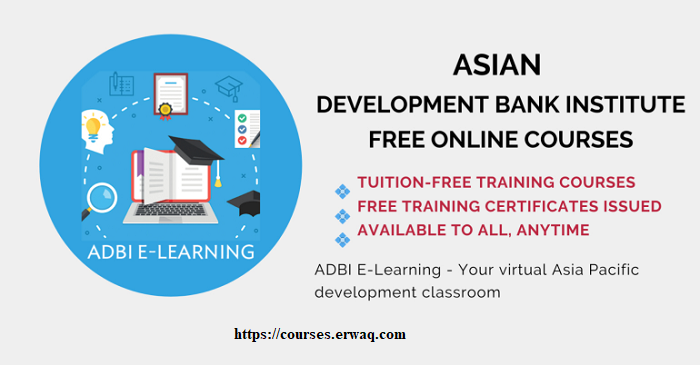Asian Development Bank Institute E-Learning (Online Courses)
Why choose ADBI E-Learning?
- Tuition-free training courses in Asia Pacific development
- Access to lectures from leading experts on key development topics
- Training certificates issued by ADBI for completed courses
- Build your qualifications for Asia Pacific development jobs and promotion opportunities
- Manage your course completion progress with personalized user accounts
Which ADBI E-Learning option is right for you?
Online Lecture Series
- Online courses available to all, anytime
- Choose from a range of development topics
- Earn training certificates and track your progress
Policy Maker E-Training
- Fixed semester-length training courses for policy makers
- Online + in-classroom learning at Asian Development Bank Institute in Tokyo
- Supports career development
Enroll now for The University of Queensland’s free online academic English course
Courses
- The Role of Central Banks and Financial Supervisory Authorities in Governing Sustainable Finance
- Climate Change and Sovereign Risk
- Governing Sustainable Finance
- Demographic Transition and its Impacts
- Green Investments: Renewable Energy
- Energy Economics, Environment, and Policy
- Leveraging Services for Development: Prospects and Policies
- Fostering Growth and Inclusion in Asia’s Cities
- Introduction to Sustainable Development in Asia and the Pacific
- Financial Globalization, Capital Flows, and the Global Financial Cycle
- Financial Integration in Southeast Asia
- Advancing the Digital Economy for Sustainable Growth in Asia
- Financial Inclusion: Evolution and Contemporary Challenges
- Achieving Sustainable Development Goals on Water and Sanitation
- Financial Inclusion, Financial Literacy, and Financial Education in Asia
- Private Financing for Infrastructure and Sustainable Growth
- ADBI Policy Maker E-Training: Financial Inclusion in Asia and the Pacific
See this British Council Free Online Courses With Free Certificates
About Asian Development Bank Institute (ADBI)
The Asian Development Bank Institute was established in 1997 in Tokyo, Japan, to help build capacity, skills, and knowledge related to poverty reduction and other areas that support long-term growth and competitiveness in developing economies in Asia and the Pacific.
The Asian Development Bank Institute is an Asian think tank focused on identifying effective development strategies for Asia and the Pacific, and on providing support to ADB member countries in managing development challenges.
ADBI provides intellectual input for policy makers in ADB’s developing member countries (DMCs). It does so by conducting research with a focus on medium- to long-term development issues of strategic importance that affects the region and through capacity building and training (CBT) activities that contribute to ADB’s overarching objective of poverty reduction.
Your chance English for Career Development – US Embassy
The objectives of ADBI are to identify effective development strategies and improve the capacity for sound development of the agencies and organizations engaged in development work in ADB’s DMCs. ADBI focuses its activities on areas where it has a strategic advantage, such as the analysis of emerging policy issues from regional as well as medium- to long-term perspectives, and the facilitation of policy dialogue among senior DMC policy makers. ADBI also seeks to enhance its visibility, impact, and accessibility through high-quality knowledge products and services. It strives to be a trusted source of insight, knowledge, and information to which policy makers, academics, and others interested in Asia’s development issues turn for guidance.
| Dean | Tetsushi Sonobe |
|---|---|
| Office | Tokyo, Japan |
| Founded | 1997 |
| Departments | Research Capacity Building and Training Administration, Management, and Coordination |
| Personnel | 61, representing 16 nationalities (As of end August 2020) |
| Budget | $16.6 million (2021) |
Apply for Google Career Certificates (Free courses for the most important areas of the labor market)



